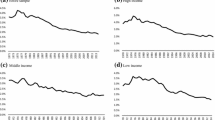Abstract
Recently, there are a few empirical studies relating to the military spending and other macro variables such as real exchange rate, unemployment rates, investment rates, budget, and inflation rates. We examine the relationship between military spending and black market premium, in the Greece using the autoregressive distributed lag approach for the time period 1954–1998. Our results implied that higher military spending leads to higher black market premium and we concluded that while military spending does not Granger cause black market premium in the short run, black market premium does Granger cause military spending in the short run. When we examine the long-run results, ELC model implies that almost 30 % of the disequilibrium of the previous year’s shocks adjusts back to the long run equilibrium.
Similar content being viewed by others
References
Alexander WRJ (1990) The impact of defense spending on economic growth: a multisectoral approach to defense spending and economic growth with evidence from developed economies. Def Econ 2(1):39–55
Atesoglu HS, Mueller MJ (1990) Defense spending and economic growth. Def Econ 2(1):19–27
Bahmani-Oskooee M, Goswami G (2006) Military spending and the black market premium in developing countries. Rev Soc Econ 64(1):77–91
Benoit E (1973) Defense and economic growth in developing countries. Lexington Books, Lexington
Benoit E (1978) Growth and defense in developing countries. Econ Dev Cult Chang 26(2):271–280
Bergstrand JH (1992) Real exchange rates, National price levels and the peace dividend. Am Econ Rev 82(2):55–61
Biswas B, Ram R (1986) Military expenditures and economic growth in less developed countries: an augmented model and further evidence. Econ Dev Cult Chang 34(2):361–372
Dommen E, Maizels A (1988) The military burden in developing countries. J Mod Afr Stud 26(3):377–401
Dunne P, Nikolaidou E (2001), Military spending and economic growth in the economic of European: a causel analysis for Greece Spain and Portugal. http://mubs.mdx.ac.uk/research/discussionpapers/economics(dpapeconno100).pdf
Engle RF, Granger CWJ (1987) Cointegration and error correction: representation, estimation, and testing. Econometrica 55:251–276
Frederiksen PC, Looney RE (1983) Defense expenditures and economic growth in developing countries. Armed Forces Soc 9(4):633–645
Granger CWJ (1969) Investigating causal relation by econometric and cross-sectional method. Econometrica 37:424–438
Granger CWJ (1988) Some recent developments in a concept of causality. J Econ 39:199–211
Huang JT, Kao AP (2005) Does defence spending matter to employment in Taiwan? Def Peace Econ 16:101–115
Jeong B (2000) Bad policies under an autocrat’s production, Working Paper No. 0012002, Public Economics Series, October, Economics Working Paper, Archive At Wustl
Kennedy G (1974) The military in the third world. Scribner, New York
Kinsella D (1990) Defense spending and economic performance in the United States. Def Econ 1:295–309
Kollias C, Makrydakis S (2000) A note on the causal relationship between defense spending and growth in Greece: 1955–93. Def Peace Econ 11(2):173–184
Mueller MJ, Atesoglu HS (1993) Defence spending, technological change, and economic growth in the United States. Def Econ 4:259–269
Mintz A, Huang C (1991) Guns versus butter: the indirect link. Am J Political Sci 35(3):738–757
Nourzad F (1987) A reexamination of the effect of rapid military spending on inflation. Q J Bus Econ 26(3):57–66
Özsoy O (2008) Government budget deficits, defence expenditure and income distribution: the case of Turkey. Def Peace Econ 19(1):61–75
Payne JE, Ross K (1992) Defence spending and the macroeconomy. Def Econ 3:161–168
Pesaran MH, Shin Y (1999) An autoregressive distributed lag modelling approach to cointegration analysis. In: Storm S (ed) Econometrics and economic theory in the 20th century: the Ragnar Frisch Centennial Symposium. Cambridge Univ. Press, Cambridge. http://www.Econ.Cam.Ac.Uk/Faculty/Pesaran/Ardl.Pdf
Pesaran MH, Smith RP (1998) Structural analysis of cointegrating VARs. J Econ Surv 12(5):471–505
Pesaran MH, Shin Y, Smith RJ (2001) Bounds testing approaches to the analysis of level relationships. J Appl Econom 16:289–326
Reinhart CM, Rogoff KS (2004) The modern history of exchange rate arrangements: a reinterpretation. Q J Econ CXIX(1):1–48
Sezgin S (1997) Country Survey X: defence spending in Turkey. Def Peace Econ 8(4):381–409
Sezgin S (2000) A note on defence spending in Turkey: new findings. Def Peace Econ 11(4):427–435
Smith RP (1977) Military expenditure and capitalism. Camb J Econ 1(1):61–76
Tang JH, Lai CC, Lin ES (2009) Military expenditure and unemployment rates: granger causality tests using global panel data. Def Peace Econ 20(4):253–267
Yildirim J, Sezgin S (2002) A system estimation of the defense-growth relation in Turkey. In: Brauer J, Paul Dunne J (eds) Arming the south: the economics of military expenditure, arms production and arms trade in developing countries. Palgrave, New York, pp 319–335
Yildirim J, Sezgin S (2003) Military expenditure and employment in Turkey. Def Peace Econ 14:129–139
Author information
Authors and Affiliations
Corresponding author
About this article
Cite this article
Aslan, A. The Relationship Between Military Spending and Black Market Premium in Greece: An ARDL Approach. Transit Stud Rev 19, 155–161 (2012). https://doi.org/10.1007/s11300-012-0237-3
Published:
Issue Date:
DOI: https://doi.org/10.1007/s11300-012-0237-3



